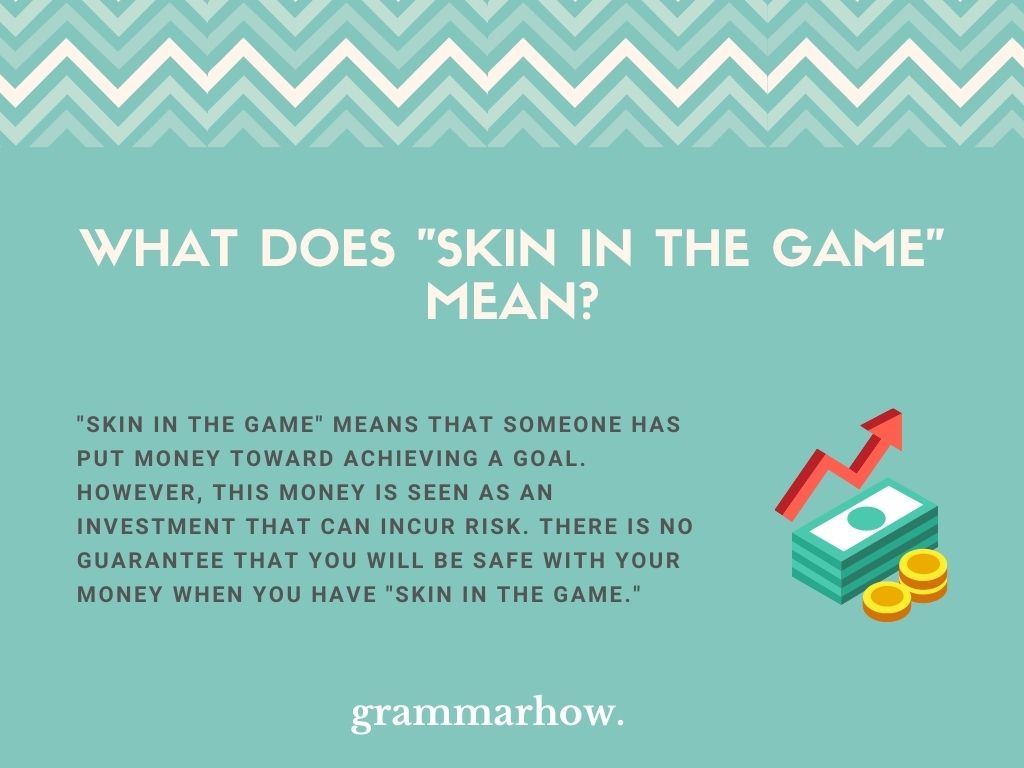We can use the idiom “skin in the game” when referring to finance and marketing. It’s a good way of saying that somebody has invested money into something to try and make a good return. However, you might not know the origin, which this article will explore.
What Does “Skin In The Game” Mean?
“Skin in the game” means that someone has put money toward achieving a goal. However, this money is seen as an investment that can incur risk. There is no guarantee that you will be safe with your money when you have “skin in the game.”

Part of the idea comes from the “risk to reward” ratio that people work with. Having your “skin in the game” is a good way to show that you’re happy to take big risks while expecting big rewards and profits if they pay off.
Of course, that doesn’t always mean you’re going to get your money back; however, the idiom shows that it’s worth taking risks sometimes to see what might happen!
What Is The Origin Of “Skin In The Game”?
Now that we’ve covered the meaning, it’s time to go back to when we first saw it used. Sometimes, this helps us to understand more about its meaning and why it’s so popular today.
“Skin in the game” was first mentioned in a 1986 Wall Street Journal article. An executive in this article wrote that “others don’t have skin in the game the way the marketing rep does.”
From this origin, we can see that “skin in the game” referred to each person’s individual investment in something.
There are plenty of other cases in recent history where “skin in the game” found usage. The meaning was always roughly the same.
For example, in 1997, “Computerworld” published an article about turning contracts into partnerships. This article made clear that large investments were known as having “skin in the game,” which showed that you were making a big commitment with your money.
Examples Of How To Use “Skin In The Game” In A Sentence
Now let’s go over some examples and see how it might be possible for you to make the phrase work.
- If you haven’t got skin in the game, you can’t sit with us. Only the big bosses can sit at this table.
- You need to have skin in the game if you’re ever going to learn more about what you can get out of your investments.
- In order to have skin in the game, you need a sizeable capital ready to go at any moment.
- We should make sure that we have skin in the game like everyone else. Otherwise, we might be left behind.
- Do you think you have enough skin in the game to make this partnership work?
- They didn’t put enough skin in the game for my liking, which showed me more about their characters and business dealings than they realized.
- I would like to put some skin in the game, but I simply do not have the money required to be effective.
“Skin in the game” usually always refers to financial investment. This investment will almost always come with a risk too, which is why so many people are against doing it if they do not have enough money to their name to begin with.
Before you can invest in anything, it’s common for people to have sizeable capital. That means they will not miss any of the money they might lose. While they lose something, it’s not a true risk.
It might not be worth the risk to potentially lose a large percentage of your income for anyone without a large capital.
Is “Skin In The Game” Offensive?
Finally, it might help to learn whether the idiom comes with any unexpected offenses.
“Skin in the game” is not an offensive term. It’s a common financial phrase that people use to show how much money they’re willing to put into an investment. Usually, this amount will result in a loss if their investment ends up falling through.
While different people and companies will have different values attributed to their “skin in the game” investments, it is never meant to be used as a rude phrase to highlight someone’s lower capital.
You may also like: 10 Good Synonyms For “Skin In The Game” In Investments

Martin holds a Master’s degree in Finance and International Business. He has six years of experience in professional communication with clients, executives, and colleagues. Furthermore, he has teaching experience from Aarhus University. Martin has been featured as an expert in communication and teaching on Forbes and Shopify. Read more about Martin here.
